
Robin Lynn Treptow
Great Falls, Montana
Doctoral Candidate Fielding Graduate University School of Leadership for Change Infant and Early Childhood Development with Emphases in Mental Health & Development Disabilities
Licensed Clinical Psychologist
More
Ever since I watched professionals and family members mourn the birth of my son—who has a disability-related medical diagnosis—I have set my mind to rooting out the social basis for why persons with this disorder (Trisomy 21) are seen as less capable than others. I even re-named the disorder’s informal name (i.e., Double Scoop vs. Down’s Syndrome) because I felt so strongly that its poorer-learning outcomes resulted from widespread social rejection—which muted chances to absorb knowledge readily (see Borthwick, 1996).
As a clinical psychologist who worked with children I was already informed about social processes: ideas like “self-fulfilling prophecy” where what others (e.g., teachers) think drives how much a child learns and “learned helplessness” where no one thinks a problem can be solved so everyone gives up and no longer tries to solve it. But it was beyond my skill to make sense of how deep the unspoken biases against a person with my son’s disorder actually were. As he grew, I decided to build my research skills and begin to tease apart the question. I am now working on a study of doctors’ unspoken negative ideas about newborn infants with medical conditions expected to result in learning or other problems.
As to my scholarly background, I have a doctorate in clinical psychology from the University of Nebraska-Lincoln (1999). In 1990 I trained on a Federal infant-toddler early intervention grant at the University of Nebraska Medical Center. I have assessed and treated very young children—including those with special needs. Last year I presented work related to diagnosis-based bias at meetings for the World Association for Infant Mental Health (Prague; May-June) and the International School Psychology Association (Amsterdam; July).
December 2016